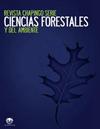估计大面积森林火灾发生的指数
IF 0.6
4区 农林科学
Q3 Agricultural and Biological Sciences
Revista Chapingo Serie Ciencias Forestales Y Del Ambiente
Pub Date : 2020-08-30
DOI:10.5154/r.rchscfa.2019.11.082
引用次数: 0
摘要
引言:估计火灾发生的风险有助于减少人员、基础设施和自然资源的损失;促进维持和恢复火灾制度的活动;以及优化用于抑制的资源。目的:建立一个大面积森林火灾发生指数,称为火灾危险区(SeR)。材料和方法:该指数对应于与每年受森林火灾影响的区域密度分布右尾部测量的概率水平相关的区域。密度分布是根据墨西哥各州受影响地区(1970-2018年)的历史估算的。拟合是通过最小化Kolmogorov-Smirnov统计量来进行的,有四个模型:指数、伽玛、对数正态和威布尔。提出了两个相关指标:受野火影响的森林面积比例(PSeR)和风险增加面积(ISeR)。结果和讨论:所有模型都显示出统计学上显著的拟合(P结论:SeR是一个提供有用信息的极端事件风险指数,具有统计学上可接受的预测能力。本文章由计算机程序翻译,如有差异,请以英文原文为准。
Index for the estimation of the occurrence of forest fires in large areas
Introduction: Estimating the risk of occurrence of a fire contributes to reducing human, infrastructure and natural resource losses; promoting activities to maintain and restore fire regimes; and optimizing resources for suppression.
Objective: To develop an index of occurrence of forest fires on large areas, called Area at risk of fire (SeR).
Materials and methods: The index corresponds to the area associated with a probability level measured at the right tail of the density distribution of the area affected annually by forest fires. The density distribution was estimated from the history of the area affected (1970-2018) in Mexico by state. The fit was performed by minimizing the Kolmogorov- Smirnov statistic with four models: exponential, gamma, lognormal and Weibull. Two related indicators are proposed: proportion of forest area affected by wildfires (PSeR) and incremental area at risk (ISeR).
Results and discussion: all models showed a statistically significant fit (P
Conclusion: SeR is an extreme event risk index that provides useful information and has a statistically acceptable predictive power.
求助全文
通过发布文献求助,成功后即可免费获取论文全文。
去求助
来源期刊
CiteScore
1.20
自引率
16.70%
发文量
0
审稿时长
>12 weeks
期刊介绍:
The Revista Chapingo Serie Ciencias Forestales y del Ambiente (RCHSCFA) is a scientific journal that aims to raise awareness of high-quality research products related to forest, arid, temperate and tropical environments in the world. Since its foundation in 1994, the RCHSCFA has served as a space for scientific dissemination and discussion at a national and international level among academics, researchers, undergraduate and graduate students, forest managers and public/private entities that are interested in the forest environment.
All content published in the journal first goes through a strict triple-blind review process and is published in the following formats: Scientific Articles, Review Articles, Methodologies, Technical or Technological Notes.

 求助内容:
求助内容: 应助结果提醒方式:
应助结果提醒方式:


